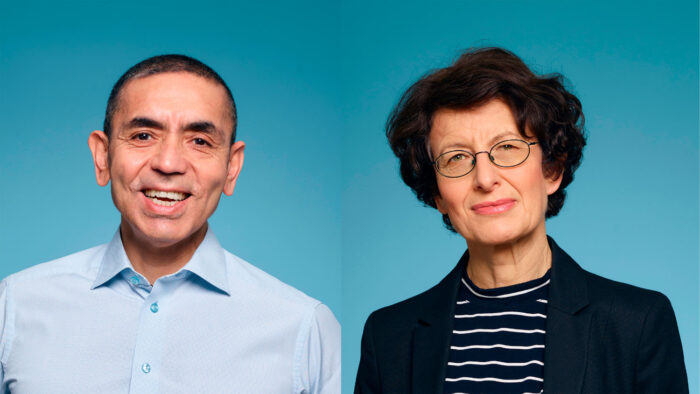
Uğur Şahin and Özlem Türeci, of BioNTech, will deliver the 2022 César Milstein Lecture on Tuesday 26th July at 10:00 AM (BST) and 11:30 AM (BST). They will be discussing the applications of messenger RNA (mRNA) technology in vaccines for cancer and COVID-19. The talk will be hybrid: held in person in our Max Perutz Lecture Theatre and on Zoom, and is open to all who are interested.
BioNTech was founded in 2008 by Uğur and Özlem, alongside Christoph Huber, with a mission to develop and produce individualised immunotherapies for cancer treatments, using mRNA to incite an antigenic immune response in patients. After reading about COVID-19 in January 2020, Uğur redirected the company to apply this technology to finding a coronavirus vaccine – an endeavour named ‘Project Lightspeed’. BioNTech collaborated with US pharmaceutical company, Pfizer, and by November 2020 they had a vaccine candidate which was over 90% effective in protecting people from transmission.
Uğur Şahin
Uğur Şahin is co-founder and Chief Executive Officer of BioNTech, and also Professor of Translational Oncology and Immunology at Johannes Gutenberg University of Mainz. He received a doctorate degree from the University of Cologne in 1992 with a thesis on immunotherapy treatment for cancer cells. He continued his research at Saarland University, where he met Özlem Türeci.
Uğur will give the first half of the lecture at 10:00AM (BST) titled ‘mRNA Cancer Vaccines.’
Lecture abstract:
The purpose of a therapeutic cancer vaccine is to instruct the patient’s immune system to recognise and eliminate cancer cells. The origins of using mRNA for delivery of cancer vaccines date back to the 1990s. However, early attempts were hampered by low vaccine potency and lack of clinical activity due to various biological and technological challenges. This talk will provide an overview on the scientific groundwork, key discoveries, inventions, and technological solutions that have paved the development and clinical application of highly potent, personalised mRNA cancer vaccines, a novel approach that for the first time allows a treatment to be individually tailored to the complex genetic profile of a patient’s tumour.
Özlem Türeci
Özlem Türeci is co-founder and Chief Medical Officer at BioNTech, and is also Professor of Personalised Cancer Immunotherapy at Johannes Gutenberg University of Mainz. She studied medicine at Saarland University, receiving her doctorate in 1992. Her subsequent research focused on the characterisation of tumour-specific molecules and developing immunotherapies to treat cancer.
Özlem will give the second half of the lecture at 11:30AM (BST) title ‘Project Lightspeed – The discovery of the first Covid-19 mRNA Vaccine.’
Lecture abstract:
With the outbreak of the SARS CoV-2 pandemic in January 2020, we launched Project Lightspeed with the goal of developing a safe and effective mRNA vaccine in the shortest possible time without skipping the steps of regular vaccine development. The talk will cover the research and the findings that led to the discovery, development, and licensure of the first COVID-19 vaccine within 10 months after project initiation. The talk will provide immunological insights into the mechanisms of antibody and T cell immune responses triggered by the COVID-19 mRNA vaccine, into the mode of action of vaccine boosters, and report on research on Omicron-adapted vaccines. The lecture will conclude with our technological approach to establish mRNA production in other regions and democratise global access to innovative medicines.
Background information
The César Milstein Lecture is named in honour of LMB Nobel Laureate César Milstein. The lecture is one of a series of named lectures, organised by the LMB and given by eminent scientists from around the world.
César was born in Argentina in 1927. After completing PhDs in both Buenos Aires and Cambridge, he embarked on a brief spell of research in Argentina before he joined the LMB in 1963. César then completed the rest of his career and his life in the UK. César developed an early interest in immunology, with his research concentrated on antibody structure and diversity. In the early 1970s, he and his postdoc, Georges Köhler, developed the technique used to produce monoclonal antibodies. This work led to them being jointly awarded the 1984 Nobel Prize in Physiology and Medicine. The technique developed by César and Georges has since been developed further by LMB colleagues for therapeutic applications, leading to the creation of several MRC spin-out companies. César continued his research on how somatic mutation arises in immunoglobulin genes. He died in Cambridge on 24 March 2002.
Further references
Zoom link for the lectures
BioNTech
Poster for the Milstein Lecture (Part 1) – Uğur Şahin
Poster for the Milstein Lecture (Part 2) – Özlem Türeci
LMB Named Lectures